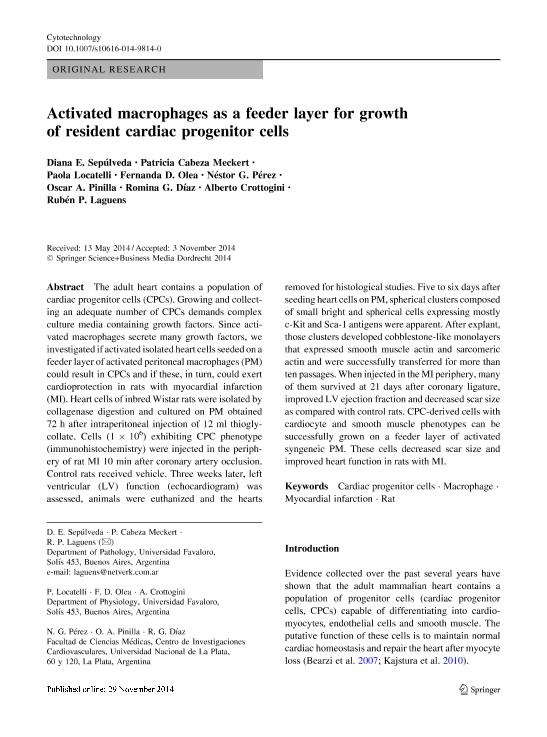Mostrar el registro sencillo del ítem
dc.contributor.author
Sepúlveda, Diana Elizabeth

dc.contributor.author
Cabeza Meckert, Patricia

dc.contributor.author
Locatelli, Paola

dc.contributor.author
Olea, Fernanda Daniela

dc.contributor.author
Perez, Nestor Gustavo

dc.contributor.author
Pinilla, Oscar Andres

dc.contributor.author
Diaz, Romina Gisel

dc.contributor.author
Crottogini, Alberto José

dc.contributor.author
Laguens, Rubén

dc.date.available
2018-02-14T18:27:08Z
dc.date.issued
2014-11
dc.identifier.citation
Sepúlveda, Diana Elizabeth; Cabeza Meckert, Patricia; Locatelli, Paola; Olea, Fernanda Daniela; Perez, Nestor Gustavo; et al.; Activated macrophages as a feeder layer for growth of resident cardiac progenitor cells; Springer; Cytotechnology (dordrecht); 68; 4; 11-2014; 665-674
dc.identifier.issn
0920-9069
dc.identifier.uri
http://hdl.handle.net/11336/36443
dc.description.abstract
The adult heart contains a population of cardiac progenitor cells (CPCs). Growing and collecting an adequate number of CPCs demands complex culture media containing growth factors. Since activated macrophages secrete many growth factors, we investigated if activated isolated heart cells seeded on a feeder layer of activated peritoneal macrophages (PM) could result in CPCs and if these, in turn, could exert cardioprotection in rats with myocardial infarction (MI). Heart cells of inbred Wistar rats were isolated by collagenase digestion and cultured on PM obtained 72 h after intraperitoneal injection of 12 ml thioglycollate. Cells (1 × 106) exhibiting CPC phenotype (immunohistochemistry) were injected in the periphery of rat MI 10 min after coronary artery occlusion. Control rats received vehicle. Three weeks later, left ventricular (LV) function (echocardiogram) was assessed, animals were euthanized and the hearts removed for histological studies. Five to six days after seeding heart cells on PM, spherical clusters composed of small bright and spherical cells expressing mostly c-Kit and Sca-1 antigens were apparent. After explant, those clusters developed cobblestone-like monolayers that expressed smooth muscle actin and sarcomeric actin and were successfully transferred for more than ten passages. When injected in the MI periphery, many of them survived at 21 days after coronary ligature, improved LV ejection fraction and decreased scar size as compared with control rats. CPC-derived cells with cardiocyte and smooth muscle phenotypes can be successfully grown on a feeder layer of activated syngeneic PM. These cells decreased scar size and improved heart function in rats with MI.
dc.format
application/pdf
dc.language.iso
eng
dc.publisher
Springer

dc.rights
info:eu-repo/semantics/openAccess
dc.rights.uri
https://creativecommons.org/licenses/by-nc-sa/2.5/ar/
dc.subject
Cardiac Progenitor Cells
dc.subject
Macrophage
dc.subject
Myocardial Infarction
dc.subject
Rat
dc.subject.classification
Otras Ciencias Biológicas

dc.subject.classification
Ciencias Biológicas

dc.subject.classification
CIENCIAS NATURALES Y EXACTAS

dc.title
Activated macrophages as a feeder layer for growth of resident cardiac progenitor cells
dc.type
info:eu-repo/semantics/article
dc.type
info:ar-repo/semantics/artículo
dc.type
info:eu-repo/semantics/publishedVersion
dc.date.updated
2018-02-14T13:19:42Z
dc.journal.volume
68
dc.journal.number
4
dc.journal.pagination
665-674
dc.journal.pais
Alemania

dc.journal.ciudad
Berlin
dc.description.fil
Fil: Sepúlveda, Diana Elizabeth. Universidad Favaloro; Argentina
dc.description.fil
Fil: Cabeza Meckert, Patricia. Universidad Favaloro; Argentina
dc.description.fil
Fil: Locatelli, Paola. Universidad Favaloro; Argentina
dc.description.fil
Fil: Olea, Fernanda Daniela. Universidad Favaloro; Argentina
dc.description.fil
Fil: Perez, Nestor Gustavo. Consejo Nacional de Investigaciones Científicas y Técnicas. Centro Científico Tecnológico Conicet - la Plata. Centro de Investigaciones Cardiovasculares "Dr. Horacio Eugenio Cingolani". Universidad Nacional de la Plata. Facultad de Ciencias Médicas. Centro de Investigaciones Cardiovasculares "Dr. Horacio Eugenio Cingolani"; Argentina
dc.description.fil
Fil: Pinilla, Oscar Andres. Consejo Nacional de Investigaciones Científicas y Técnicas. Centro Científico Tecnológico Conicet - la Plata. Centro de Investigaciones Cardiovasculares "Dr. Horacio Eugenio Cingolani". Universidad Nacional de la Plata. Facultad de Ciencias Médicas. Centro de Investigaciones Cardiovasculares "Dr. Horacio Eugenio Cingolani"; Argentina
dc.description.fil
Fil: Diaz, Romina Gisel. Consejo Nacional de Investigaciones Científicas y Técnicas. Centro Científico Tecnológico Conicet - la Plata. Centro de Investigaciones Cardiovasculares "Dr. Horacio Eugenio Cingolani". Universidad Nacional de la Plata. Facultad de Ciencias Médicas. Centro de Investigaciones Cardiovasculares "Dr. Horacio Eugenio Cingolani"; Argentina
dc.description.fil
Fil: Crottogini, Alberto José. Universidad Favaloro; Argentina
dc.description.fil
Fil: Laguens, Rubén. Universidad Favaloro; Argentina
dc.journal.title
Cytotechnology (dordrecht)

dc.relation.alternativeid
info:eu-repo/semantics/altIdentifier/doi/http://dx.doi.org/10.1007/s10616-014-9814-0
dc.relation.alternativeid
info:eu-repo/semantics/altIdentifier/url/https://link.springer.com/article/10.1007%2Fs10616-014-9814-0
Archivos asociados
